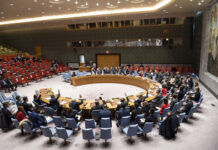Photo credit: DiasporaEngager (www.DiasporaEngager.com).
This week’s Torah portion starts with the word Vayakhel. It means “gathering together.” Moses gathered together the whole community to be involved in the construction of the Tabernacle under the direction of Bezalel and Oholiav.
Vayakhel is an unusual word that is used again right at the end of the last book of the Torah (abbreviated from Deuteronomy 31:10-13):
Every seventh year, at the Feast of Sukkot, all Israel should be gathered together, and you shall read the Torah aloud in the presence of everyone … in your communities that they may hear the words of the Torah and so learn to observe faithfully every word of this Teaching.
This emphasizes two important fundamentals of Judaism: community and individuality. The Torah subdivides the community into families and tribes, and then ascribes different roles to each one of them. The idea of a people, a nation, a community, is an obvious one and its cohesive culture is underlined by the fact that immediately after the opening instruction, the Torah mentions Shabbat and adds one specific law that we haven’t mentioned before: “You shall not burn fire in your habitation on the Shabbat” (Exodus 35:3).
We’ve already heard the proscriptions about work and other activities on Shabbat, so what does the law about fire add? Some literalists like the Samaritans and Karaites believed there should be no fire at all in our homes on Shabbat. But the oral law decided that we may have fire, so long as it is prepared beforehand.
Why do we now, in the 21st century, associate fire with electricity? In ancient times, it was fire that drove society. Shabbat aimed to create a day as different and not dependent on the way that society ran during the week, when everyone needed and made use of fire. Nowadays it is electricity that is the basis of industrial and technological societies. If we were to cut off electricity, we would be stuck. We’re dependent. And Shabbat tries to make a break in this dependency to appreciate other values — to come together and create an alternative community. This, again, stresses the importance of the nation as a specific group.
But just as important is the idea of individuality. It is a modern concept — yet it does not mean that personal empowerment, responsibility, and differences were not recognized and valued by the Torah.
In Exodus chapter 35, men and women who have skills, expertise, and talent, are invited to contribute to the construction of a community focal point. Thus, both individuality and community are stressed. We have to preserve the community. But the community depends on individuals, and they have to be recognized for their individuality both in skills and ideas.
Throughout Jewish history, we’ve seen the desire for people to come together and live in like-minded communities on the one hand, and yet still be individuals and empowered spiritually and materially. Just think of all the various sects and political positions within Judaism today. In many ways, this may seem divisive. But I argue that this is what’s helped us survive — being a community, but also being different. Having our cake and eating it too, so to speak.
The author is a writer and rabbi, currently based in New York.
Source of original article: Jeremy Rosen / Opinion – Algemeiner.com (www.algemeiner.com).
The content of this article does not necessarily reflect the views or opinion of Global Diaspora News (www.GlobalDiasporaNews.com).
To submit your press release: (https://www.GlobalDiasporaNews.com/pr).
To advertise on Global Diaspora News: (www.GlobalDiasporaNews.com/ads).
Sign up to Global Diaspora News newsletter (https://www.GlobalDiasporaNews.com/newsletter/) to start receiving updates and opportunities directly in your email inbox for free.































